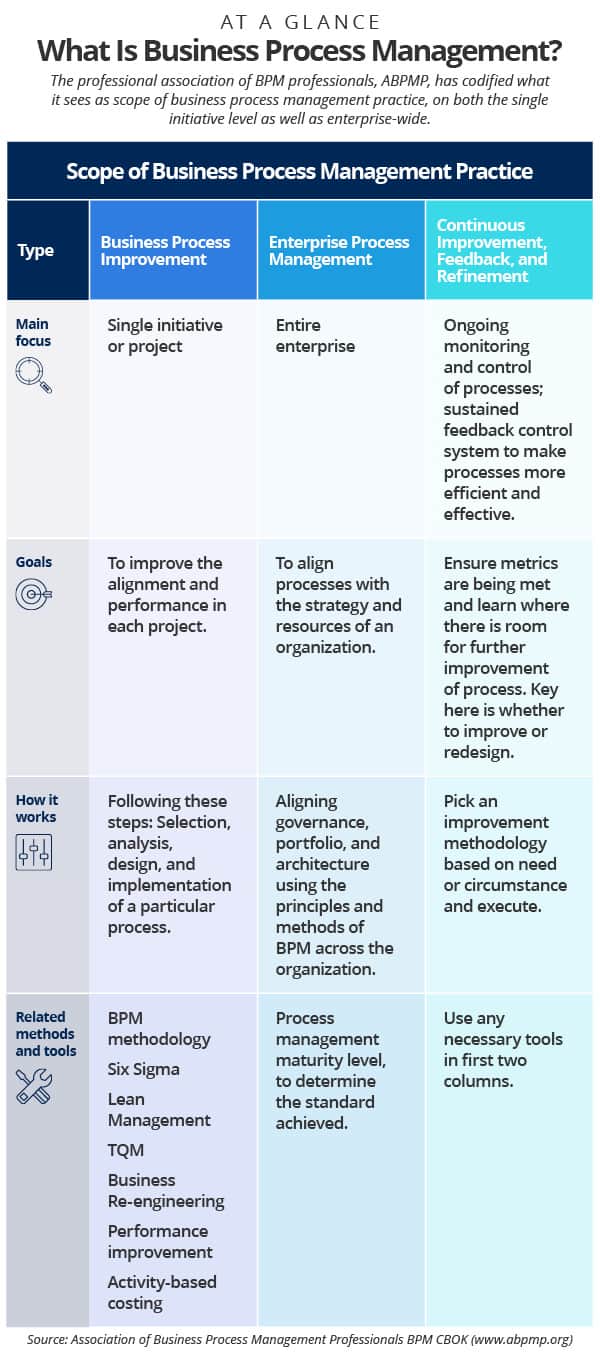What Is Business Process Management (BPM) Certification?
Many organizations offer some kind of business process management training and certification, but there is no common, agreed-upon industry standard among them. One of the largest professional associations of those who practice BPM is the BPM Institute (BPMI), which has 50,000 members. The other high-profile association is called the Association of Business Process Management Professionals (ABPMP), which was founded in 2003. Its 15,000 members consider the ABPMP to be what the Project Management Institute (PMI) is for project managers. That said, all kinds of job roles can be included in BPM—project managers, program managers, consultants, administrators, even directors or C-level executives. The unifying factor is that these employees are responsible for managing processes at their organization.
Affiliation with ABPMP requires membership dues and accredited certification training (more on this below).
Here is a high-level look at the step-by-step business case for BPM in the modern business landscape and how it is typically set up and run within an organization:
-
An organization designs a process, either from scratch or by working with and adapting existing processes, to manage workflow, communications, etc.
-
In creating a BPM system, the organization must decide how they will monitor workflow and project deliverables.
-
Sometimes, flow charts can help a project manager or BPM expert visualize the process(es) and where efficiencies or pain points might occur.
-
After a design is in place, a BPM manager will test it against possible and theoretical scenarios, including changes in the financial landscape, in the competitive marketplace, outside factors, and so forth. Depending on the results of this theoretical testing, or modeling, you can then tweak the design.
-
The organization executes the process management. In the current business and tech landscape, typically there are IT/software managers as well as project or program managers officiating as process managers.
-
The organization then collects data constantly and analyzes it to improve, refine, and streamline the processes.
BPM certification is the result of specified technical education in managing business processes. Certification can result in a diploma or a certificate of completion. Organizations that offer BPM training range from accredited universities and business schools to free online class sites to associations and business groups. There is no current set of agreed-upon criteria for courses or certifications.
What Is the BPM Certification Value?
BPM certification can add value both to recipients and their organizations in several ways. Hiring managers find that certification validates that a candidate has been evaluated against industry criteria (with the overall caveat that there is currently no true standardization across this landscape).
BPM practitioners in an organization can evangelize the value of the certification among colleagues, which can help ensure that more people in the organization are coming from the same place.
Finally, those accredited realize value in the confidence in their new knowledge and competence.
Watermark Learning offers BMP Certification through Auburn University, and identifies three ways it can deliver value:
-
Project managers become more productive with broader knowledge and insight into how their organization can and should manage its processes.
-
An organization ultimately creates more and better products, as a result of the process management analysis.
-
Processes become smoother, faster, and more reliable, helping the company’s bottom line.
Getting a BPM certification can result in a noticeable boost in income, according to Katie Bardaro, Vice President of Data Analytics at PayScale, a company that monitors salary trends for hundreds of job titles and types of expertise.
“We’re seeing that those with BPM certification are generally making in the low six figures annually, as opposed to in the $90-95,000 a year range for people without the BPM certification,” says Bardaro.
Which BPM Certifications Are the Most Valuable?
Determining which BPM certification or training program is the most valuable to a recipient is still rather subjective. PayScale’s Bardaro says that in the data she is seeing, where someone got their BPM certification doesn’t yet show a salary difference. Most experts say that the independent associations’ certifications typically have more value, but there is no hard and fast rule at this point. However, the ABPMP makes a case for its own certifications, and for prospective students to do due diligence in researching where to get certified.
“Anybody can issue a certificate or diploma,” Benedict of ABPMP explains. “But our certification comes from thorough knowledge of the world of business process management.”
Beyond the ABPMP and BPMI, there is training available at many accredited four-year universities like Villanova University and UC-Berkeley Extension, which offer name recognition and a valued reputation. Even hiring managers unfamiliar with BPM certification will respect and value a certificate from an accredited four-year college or university.
Benedict says that BPM certification is valuable across the board for anyone involved in business process management. It is appropriate and useful for process managers both client-side or in-house, he says, as well as for consultants. Yet, the value of streamlining and managing processes well and whether a company is ultimately successful or not depends on how an organization internally adopts and adheres to the practice.
It’s important to remember that because the BPM certification field is evolving, there is no hard and fast agreement on which certification is the most respected. The ABPMP, BPMI, and OMG are among the better known, as are the certifications/diplomas from four-year universities.
Where to Get BPM Certification
There are dozens of organizations that offer diplomas or certificates in business process management. The ABPMP says it is the only organization that offers true certification, though many other programs say they do as well. Here is a sampling of organizations offering a BPM certificate, certification, or knowledge resources.
-
ABPMP: The industry association offers two types/levels of certification (see costs below), and will offer a third in the near future. The association partners with trainers it certifies to administer the courses, the exams, and the certifications. Here are the certifications it offers:
-
CBPA (Certified Business Process Associate): This certification is helpful for those in early stages of a BPM career to establish expertise. It’s also a prerequisite to get subsequent certifications.
-
CBPP (Certified Business Process Professional): This certification builds upon the expertise codified by the CBPA certification. It can represent more years of BPM experience as well as more in depth experience with managing different types of processes in different industries.
-
CBPL (Certified Business Process Leader): The ABPMP is planning on offering this highest level of certification by 2019. For more information, check with the AMPMP site.
-
-
BPM Institute: The Business Process Management Institute is another well-regarded nonprofit association of professionals. This group claims 50,000 members with several levels of memberships available, from free to pretty costly. The Institute offers certification training as well as the ability to take individual classes.
-
AIIM: The Association for Intelligent Information Management, which began in 1943 as the National Micrographics Association, offers certification as a BPM Specialist with about six months of online study. Students may also build on that to earn a BPM Master certificate.
-
Object Management Group (OMG): The organization offers several levels of study and certification, based on the Watts Humphrey Process Maturity Framework, which originated as a way to codify best practices for governments managing software processes.
-
BP Trends: BP Trends partners with several training organizations and universities around the world to provide diplomas and certifications.
-
BPM Essentials: The organization offers live online training at specified dates, or webinars available at any time. Upon completion, they issue a certificate.
-
BP Group: This organization, also called BPM Systems, offers training around the world, resulting in certificates of completion. (There are several similarly named organizations online; the website for this one is http://www.bizchange.com/.)
-
Workflow Management Coalition: This group started in 1993 and works to offer its members standardized definitions of BPM and related processes.
-
Alison: This online organization offers a course in BPM that takes about 15-20 hours to complete. Alison issues a diploma when the student finishes the course.
There are also accredited four-year colleges and universities known for their BPM accreditation courses, in person or online. These are in addition to the Watermark-affiliated instruction offered by Auburn University, mentioned above. Villanova University online and the University of California-Berkeley Extension university offer popular courses and certifications.
What Is the Cost of Taking a BPM Exam and Study?
The costs involved in getting BPM training and taking exams varies. Some organizations offer varying pricing depending on what you decide to study and the resources the organization provides. Other organizations spell out their costs, listed below:
ABPMP: The ABPMP encourages people to become members of the association, as do most of the other groups listed. The “professional” levels costs $150 a year, but other levels are also available. There is an application fee that varies. Here are the exam fees (as of the writing of this article) for different levels of certifications:
-
CBPA (Certified Business Process Associate): $400 for members, and $550 for non-members
-
CBPP (Certified Business Process Professional): $500 for members, and $650 for non-members
-
CBPL (Certified Business Process Leader): This option isn’t currently available, but is expected to launch by early 2019
Note: ABPMP requires several years of business experience in process management, with employer dates and references required, before you can take the test.
BPM Institute: $500 for the exam; an additional fee for CBOK training.
Watermark University: BPM-related classes and courses are offered individually or collectively; contact the university to learn about individual pricing.
AIIM: Specialist, $595 for non-members; members get sliding discount; AIIM Master program costs $1,785.
OMG: There are five levels of training, and costs depend on the level and whether you are a member.
BP Trends: Costs vary widely around the world.
BPM Essentials: Costs vary widely.
BP Group: Costs vary widely around the world.
Workflow Management Coalition: No certification courses offered per se, but rather a network of professionals who share best practices. Memberships offered at different levels.
Alison: BPM course is free for 15-20 hours of online study.
Villanova University Online: $5,995 for three courses.
UC Berkeley Extension: $1,850 plus materials and registration.
General Requirements Before Getting Certified
In general, people often begin working in business process management in their fields before they receive any kind of certification. A project, program, or IT manager may be charged with improving business or software development processes, and in doing so, begin to study modeling as well as instituting the mandatory step of continuous improvement. Programs offering certification or other diplomas vary in their requirements, though some require verifiable proof of employment in the field before acceptance into a program of study.
Topics Taught as Part of Getting a BPM Certification
Although the programs and courses of study vary, a student studying BPM can expect to study several key concepts. These topics are also typically included on most exams, and include the following:
-
Principles, both theoretical and practical
-
How to improve processes using analysis and design
-
Various business process technologies
-
How to measure processes across all industries and usages
-
Governance
-
Industry standards for the process management framework
-
Business skills like process improvement and analysis
-
Skills you can use to help your organization implement, and refine, the right business processes as a result of these management skills
If you are interested in taking an exam to get a BPM certification, speak with your employer. A growing number of companies will pay for their employees to get the certification, with an eye toward helping the employee — and the company — grow expertise in business process management. Some employees may decide to pay for the certification program themselves as a way to grow or change their career paths.
Potential Pitfalls in Choosing a BPM Certification Program
As noted above, there are many organizations offering diplomas, certificates, and certifications in BPM. Since there’s no real standardization across courses or organizations offering training, choosing a program can carry a risk. Each certification means something different, so hiring managers may not know exactly what they are getting or what you’ve been trained in. And if you work at an organization where certified people have their certifications from one organization, and you get yours from another, it may be harder to show the value of yours unless you are able to practice the principles you’ve learned.
Other Kinds of Business Process Certifications
There are some other important types of business process certifications available that are related to BPM certification. These specialized certifications include the following:
-
Business Process Recertifications: Some certification bodies, like the ABPMP, have certifications that expire within a period of time, for example, three years. There are requirements to become recertified, which may include maintaining organizational membership, demonstrating a certain number of hours in BPM employment, fees, etc.
-
Business Process Analysis Certification: Most organizations offering BPM certification include a strong focus on process analysis, because there’s no effective management or improvement without analysis. That said, some organizations, like International Institute of Business Analysis (IIBA), offer training and certification in business process analysis specifically.
-
Business Process Excellence Certification: This process excellence certification, sometimes called operational excellence or OpEx, often includes best practices from other disciplines, like Six Sigma (see below) for a broader-based expertise in business process management.
-
Business Process Automation Certification: Business process automation certification focuses specifically on those business processes that are, can, and should be automated. This is a growing field as more companies are employing AI and other forward-looking types of automation in their processes. While most BPM certification programs address business process automation, there are groups like the International Society of Automation (ISA) that offer training and certification specifically in this area of business process.
Other Options for Business Process Management Training/Alternatives
Some business leaders believe that other disciplines are just as effective as actual BPM certifications for business process managers.
-
Certified Quality Improvement Associate (CQIA): This beginning quality training is appropriate for nearly every employee in a firm, Weidman explains, including front-office staff, salespeople, delivery drivers, warehouse workers, and the general maintenance staff.
-
Certified Manager of Quality/Organizational Excellence (CMQ/OE): Formerly known as Certified Quality Manager, this certification is primarily designed to fit the needs of managers.
-
Certified Quality Engineer (CQE): This certification is primarily designed to fit the needs of the engineering staff, various types of production managers, and quality control staff.
-
4. Certified Six Sigma Green Belt (CSSGB): This certification is designed for any employees who are involved in quality improvement projects and who must analyze and solve quality-related problems under the leadership of a more senior project manager.
-
Certified Six Sigma Black Belt (CSSBB): This certification is designed for quality professionals who can explain (and teach) Six Sigma principles, systems and tools, understand team dynamics, and provide the required leadership during quality improvement projects.
Since the requirements of many of these ASQ certifications overlap, it is common for individual employees to earn multiple certifications as their roles and responsibilities change over the course of their careers.
According to Weidman, “All of these certifications are directly related to business process improvement."
Nonetheless, an actual BPM certification is growing in popularity, and, as PayScale’s Bardaro says, those with a BPM certification earn more than 10 percent more in salary on average, over those with Six Sigma certifications.
Benefits to Joining a BPM-Related Association
If you’re serious about being a BPM professional and staying abreast of the latest trends in the field, it may be useful to consider joining a BPM-related association. Since the field is still evolving, there can be strength in numbers, and validation in being in a group that agrees on various standards and codifications. There are dozens around the world, some with membership requirements, and some with moderate to steep membership fees. Below are the two best known ones in the U.S.:
-
ABPMP: It offers resources and networking to its 15,000 members. There is a sliding scale of varying annual fees for students, associates, professionals, and corporate members. Its name recognition has been growing over the past decade.
-
BPM Institute: It has 50,000 members, and offers annual events, resources, and speakers. Memberships range from free to $149 for premium, to $349 for professional, to a $9,500 flat fee for corporate memberships. This membership also offers access to two other groups affiliated with it, BAInstitute.org and DBizInstitute.org.
Build Powerful, Automated Business Processes and Workflows with Smartsheet
Empower your people to go above and beyond with a flexible platform designed to match the needs of your team — and adapt as those needs change.
The Smartsheet platform makes it easy to plan, capture, manage, and report on work from anywhere, helping your team be more effective and get more done. Report on key metrics and get real-time visibility into work as it happens with roll-up reports, dashboards, and automated workflows built to keep your team connected and informed.
When teams have clarity into the work getting done, there’s no telling how much more they can accomplish in the same amount of time. Try Smartsheet for free, today.



